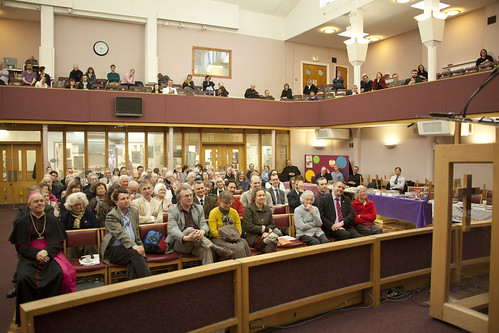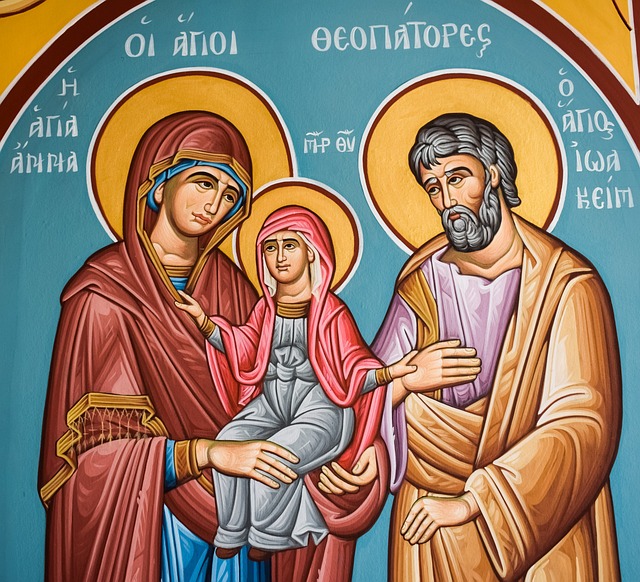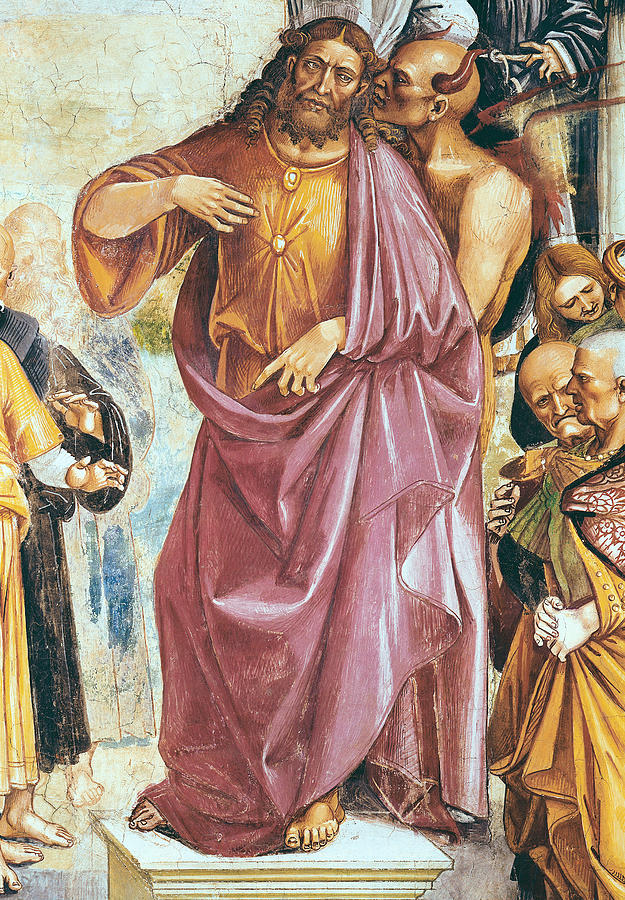A Musical Gem: Initium sapientiae timor Domini by Nicola Fago
TURN TO TRADITION -- a response to George Weigel
Fr. Richard G. Cipolla
An Apologia for the Underground: Objections and Replies on the Subject of “Underground” Masses during COVID-19
If these writings contain error, it is through my ignorance; I submit in all things to the teachings of the holy Catholic Roman Church, of which I am now a member, as I protest and promise I will be both in life and death. May our Lord God be forever praised and blessed! Amen, Amen. [1]
“The heathens have defiled Thy holy temple... Revenge the blood of Thy saints!”: On the Thymotic Realism of the Traditional Latin Mass
 |
| Titian, Averoldi Polyptych (1520-22) SS. Nazarius & Celsus are the standing figures in the lower left |
Is the All-Holy and Ever Virgin Mary truly the Mother of God -- and are therefore her parents truly Jesus' Grandparents? Francis isn't sure
On the memorial of the Saints Joachim and Anne, Jesus's “grandparents”, I would like to invite young people to do something tender towards the elderly, especially the loneliest, in their homes or residences. Dear young people, each elderly person is your grandparent!— Pope Francis (@Pontifex) July 26, 2020
News and Beautiful Images of the 7th Annual Ars Celebrandi TLM Workshop in Poland
What’s Wrong with Personalism and ‘Theology of the Body’? An Interview with Don Pietro Leone by Brother André Marie, M.I.C.M
Event: “Soul of the Apostolate 2020” Conference, July 24–26
Bishop Schneider Launches Crusade of Eucharistic Reparation
On Submission to Forms: On the Putative Equality of the “Two Forms” of the Roman Rite
On Submission to Forms: On the Putative Equality of the “Two Forms” of the Roman Rite
Washington, DC, pontifical high Mass postponed
Sermon for the 7th Sunday After Pentecost: “Beware of False Prophets!”
“Beware of false prophets who come to you in sheep’s clothing but inwardly are ravenous wolves” (Matthew 7:15)
A Saint—and a Mass—for Our Times: St. Camillus de Lellis (July 18)
150th Anniversary of the Dogmatic Constitution PASTOR ÆTERNUS (Vatican I): Petrine Primacy, Infallibility, and the Strict Limits of Papal Authority
For the Holy Spirit was promised to the successors of Peter not so that they might, by his revelation, make known some new doctrine, but that, by his assistance, they might religiously guard and faithfully expound the revelation or deposit of faith transmitted by the apostles.
Deacon Nick Donnelly's new book: A Catholic Survival Guide For Times of Emergency (TAN)
Compiègne: "To the poorest daughter of Carmel,
honor speaks louder than fear."

Mother Marie: Sister Blanche...First Commissary: I forbid you to continue...Mother Marie: You have the power to force me to silence, but none to command me to it. I represent here the Reverend Mother Prioress and I shall take no orders from you.A Commissary: Confounded old hag! She cannot be made to hold her tongue, fellow Citizen, but remind her that the Republic has a machine at its disposal that will leave her somewhat short of breath!First Commissary: Enough! I repeat that you must behave as a true representative of the people! [He turns to Sister Blanche:] Young citizen, you have nothing to fear from us, who are your liberators! Say but one word, and you will find yourself beyond the sway of those who, to better put you in their power, have not feared to offend nature in usurping even the sacred name of "mother". Henceforth, you are under the protection of the Law.Mother Marie: But she is first under my protection. Do you think I shall permit you to take any further advantage of the terror of a child? I shall take great care to avoid a language that you cannot understand. You know nothing of that which holds us here and keeps us united unto death - or, if once you knew it, it is now certainly forgotten. But there are still perhaps words which are common to us, and which can touch your conscience. Well, sir, you must know that to the poorest daughter of Carmel, honor speaks louder than fear.
Dialogues des Carmélites
On the day following her feast, the Blessed Virgin of Mount Carmel would receive her dear French daughters, martyred for their faith in her Son and for their loyalty to His Church.
[Our regular July 17 homage.]
[Personal recess for several days]
Our Lady and the Scapular: In 1251, the most extraordinary event in English history
Armatura
fortis pugnantium
furunt bella
tende praesidium
Scapularis.
Saint Elias, pray for us!
Saint Simon Stock, pray for us!
Queen of Mount Carmel, pray for us!
Et fidelium animae per misericordiam Dei requiescant in pace. Amen.
(Our regular feature for the Feast of Our Lady of Mount Carmel)
Recent Interviews on the Undeniably Resurgent Latin Mass
Topics covered:
Online conference this Saturday from the Latin mass Society
 |
| A real-world conference organised by the LMS in pre-covid days |
A Collect Fit for a King (or Rather, an Emperor): St. Henry II
 |
| The imperial pair |
O God, who on this day didst translate blessed Henry, Thy confessor, from the summit of earthly empire to an eternal kingdom: we humbly beseech Thee, that even as Thou didst protect him with the fullness of Thy grace, and dist give him victory over the enticements of this life, so Thou wouldst enable us after his example to shun the blandishments of this world and to come to Thee with clean hearts. Through our Lord Jesus Christ...
De Mattei: Fake news? No, historical truth
Event: Solemn Pontifical Mass for Our Lady of Mount Carmel - Newark, New Jersey
The Stones of Hagia Sophia will Cry Out
The Turkish government's decision yesterday to change the status of the Hagia Sophia from a museum into a mosque is significant. While the media has not given too much attention to this, the fate of what was the most prominent church in Christendom for nine centuries ought to concern us deeply. I wrote an article on the history of the Hagia Sophia and the significance of its change in status I thought I'd share:
The stones of the Hagia Sophia will still cry out
Turkey’s own version of “cancel culture” has been met with outrage and concern throughout the world.
Saint Thomas More: "This indictment is grounded upon an Act of Parliament, directly oppugnant to the laws of God and his holy Church..."

All which notwithstanding the jury found him guilty, and incontinent upon the verdict the Lord Chancellor [for that matter chief commissioner] beginning in judgment against him, Sir Thomas More said to him,
"My Lord, when I was towards the law, the manner in such case was to ask the prisoner before judgment, why judgment should not be given against him."
Whereupon the Lord Chancellor staying his judgment, wherein he had partly proceeded, demanded of him what he was able to say to the contrary. Who then in this sort mildly made answer:
"Forasmuch as, my Lord, this indictment is grounded upon an Act of Parliament, directly oppugnant to the laws of God and his holy Church, the supreme government of which, or of any part thereof, may no temporal prince presume by any law to take upon him as rightfully belonging to the See of Rome, a spiritual preeminence by the mouth of our Saviour himself, personally present upon the earth, to St. Peter and his successors, bishops of the same see, by special prerogative, granted, it is therefore in law amongst Christian men insufficient to charge any Christian."...
Announcing a New Book by Fr Armand de Malleray, FSSP: X-Ray of the Priest In a Field Hospital: Reflections on the Sacred Priesthood
On the 13th Anniversary of Summorum Pontificum, now under threat: Benedict XVI placed the Church on the path of eternity and immortality.
Summorum is now under threat, with the survey being conducted whose consequences are uncertain. There was a Church before the present reality, there will be a Church forever: and the Sacred Liturgy she celebrates here, with true Traditional and Apostolic imprint, has always been and should always be, not a reflection of the banality of the moment, but a prefiguration of her immortality as Bride of Christ and her Paschal Feast with the Lord for all Eternity, outside the limitations of our present existence.
Summorum Pontificum: Axes of Interpretation
Ever forward
Today we enter the 14th year of the era of Summorum Pontificum. Things concerning the traditional Mass have developed to varying degrees over the years - some not quite meeting our expectations, yet others exceeding them. To that end, we are asking readers - as we have in the past - to take this occasion to update Mass information on the Wikimissa site. For those unfamiliar with it, Wikimissa is an international directory of Traditional Latin Masses that was designed some years ago by a resourceful traditional Catholic in France. It has proven to be an invaluable tool for travelers, but it is also quite helpful to those just discovering and seeking out the TLM where they live. Wikimissa was in a state of neglect for several years but has recently been revitalized by some enterprising individuals who recognized its value to the worldwide TLM community. Much of the information has not been updated for some time. For that reason, we are asking everyone to consult the site for the Masses that you attend or that you know of in your area. Although the site is largely presented in French, the information for Mass times and places is easily discernible and directions for making edits can be found in English (and seven other languages) on the home page. When you make an edit, please remember to include current phone numbers and links to websites where applicable. This is of great help to those who are far away from home and need to verify dates and times for Mass.
In times like the present, the traditional Mass stands to make great strides among the Faithful. Let’s do our part to help bring them to it.
In praise of Low Mass
Strengthened with all might,
according to the power of his glory,
in all patience and longsuffering with joy,
giving thanks to God the Father,
who hath made us worthy to be partakers of the lot of the saints in light:
who hath delivered us from the power of darkness,
and hath translated us into the kingdom of the Son of his love,
in whom we have redemption through his blood, the remission of sins;
who is the image of the invisible God, the firstborn of every creature:
for in him were all things created in heaven and on earth,
visible and invisible,
whether thrones, or dominations, or principalities, or powers:
all things were created by him and in him.
And he is before all, and by him all things consist.
And he is the head of the body, the Church,
who is the beginning, the firstborn from the dead;
that in all things he may hold the primacy:
because in him, it hath well pleased the Father,
that all fullness should dwell.
And through him to reconcile all things unto himself,
making peace through the blood of his cross,
both as to the things that are on earth,
and the things that are in heaven.
De Mattei: The Unknowns at the End of a Pontificate
The demission of Benedict XVI will be remembered as
one of the most catastrophic events of our century, as it opened the door, not
only to a destructive pontificate, but above all to a situation of increasing
chaos in the Church. After seven years
since that disastrous February 11, 2013, the life of Benedict XVI and the
pontificate of Pope Francis are drawing inexorably to a close. We don’t know
which of the two events will precede the other, but in both cases, the “smoke
of Satan”” risks enveloping the Mystical Body of Christ as perhaps has never
happened in history
The Bergoglian pontificate has reached its end,
perhaps not from a chronological point of view, but most certainly from the
point of view of its revolutionary impact. The Post -Amazonian Synod has been a
failure and the Exhortation Querida
Amazonia of last February 2, was the tombstone placed on the many hopes of
the progressive world, mainly in the German zone. The Coronavirus, or Covid 19,
has definitively brought to an end the ambitious pontifical projects for 2020,
presenting us with a historical image of a solitary and defeated Pope, immersed
in the emptiness of a spectral St. Peter’s Square. On the other hand, Divine
Providence, which always regulates all human events, allowed Benedict XVI to
witness the debacle following his abdication.
But the worst is probably still to come.
It was logical to envision that with the
cohabitation of “two Popes” in the Vatican, a part of the conservative world
disgusted with Francis would have looked to Benedict, considering him the “true
Pope”, set against “the false prophet”. Whilst convinced of Pope Francis’s
errors, these conservatives didn’t want
to follow the open way of the Correctio
filialis delivered to Pope Francis on August 11, 2016. The real reason for
their reluctance is probably due to the fact that the Correctio accentuates how the roots of the Bergoglian deviations go
back to the Papacies of Benedict XVI and
John Paul II, and even before, to the
Second Vatican Council.
For many conservatives, instead, the hermeneutic of
John Paul II and Benedict XVI, won’t admit any rupture, and since the
Bergoglian papacy seems to embody the negation of this hermeneutic, the only
solution to the problem is for Francis to be out of the picture.
Reminder: Rorate Caeli Purgatorial Society






















